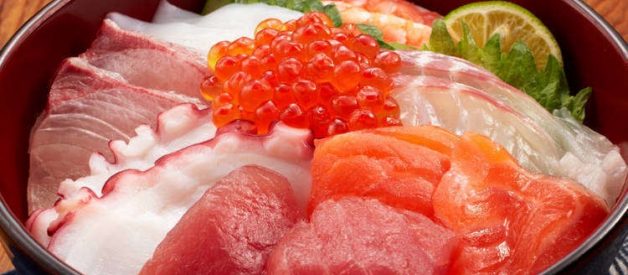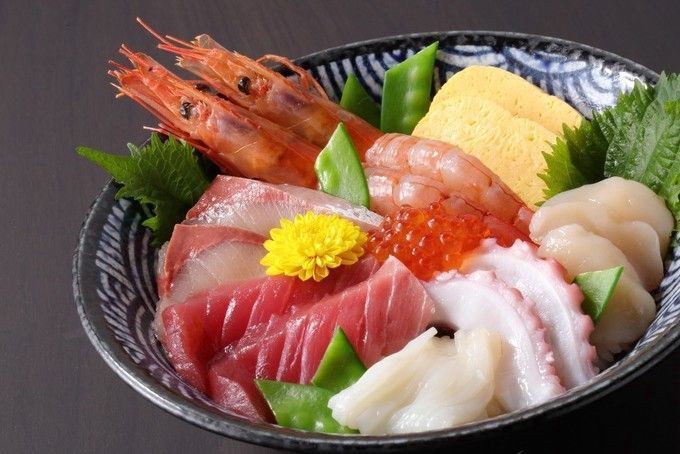
Kaisendon and Chirashi Sushi is such a delicious dish in sushi restaurants. But they are also so vastly different in the way they are prepared.
Meanwhile my research has shed light on the long history it took. Before they finally caught on and became a popular food choices.
Let?s begin-
What is Kaisendon
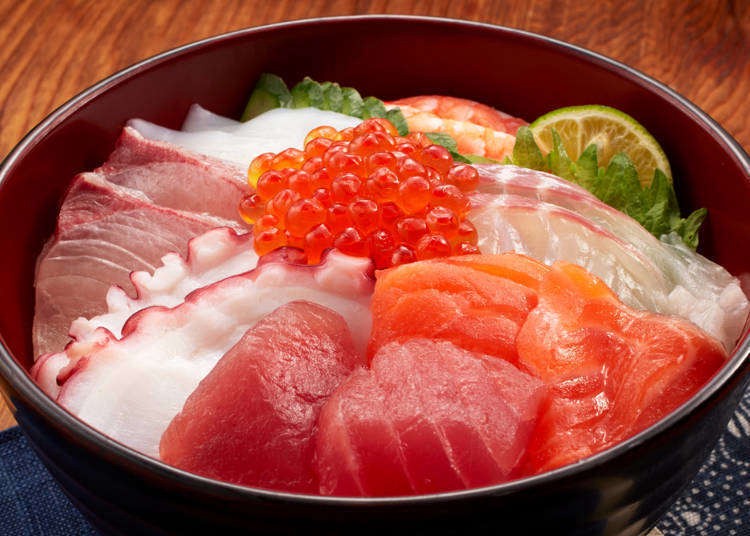
Introduction
Frequently found in many sushi restaurants in Japan. Kaisendon is a hugely popular dish for its light yet nutritious seafood that makes it a great lunch option.
Firstly Kaiser Don is a Japanese dish that consists of foods like white rice and raw sashimi. Such as squid, prawns, octopus, salmon, crab meat, sea urchin roes.
Condiment Use For Kaisendon:
Comparatively the Kaisendon?s rice is not sushi rice, but normal steamed white rice. Generally in American restaurants, the dish also comes with condiments like wasabi(Japanese Horseradish) or soy sauce.
Wasabi is a common flavoring in Japan to give the food some extra spiciness if it is not already enough. But you need to be careful not to put too much. Since wasabi paste can cause a really strong burning reaction.
Different Kaisendon Styles:
Although Kaisendon is known for its variety of sashimi, some dishes actually only have one main ingredient.
Such as Tekkadon and Negitoro Don where the main seafood is tuna. Another dish is Unidon with only sea urchins, and Ikradon that has only salmon roe.
Kaisendon History
The word Kaisendon can be translated into a ?bowl of fresh seafood?. Where kaisen means seafood and don connotes a Donburi rice bowl.
Since the preparation of sashimi can be difficult for most chefs. Due to the elaborate sashimi slices that are needed. Hence it is easier for sushi chefs to serve the Kaisendon without special cutting.
Kaisendon was first introduced in the Hokkaido and Tohoku area of Japan. The place where Kaisendon was first cooked and eaten by Fishermans at the bay.
It quickly catches on for its casual mix of sashimi and how simple it is to make that takes no time. Soon this favorite lunch special began spreading in the 19th century.
How It Grew In Popularity:
Following this dish was served in restaurants by the name of New Hatakane in Akita prefecture and Inoya in Kanazawa city.
Besides Hokkaido where it?s a very celebrated dish there, another popular place for Kaisendon includes Toyama Bay.
Where the water makes it an ideal environment for warm water fish and cold water fish. So there are over 3400 species of fish there that are caught for the various toppings of Kaisendon.
What is Chirashi Sushi
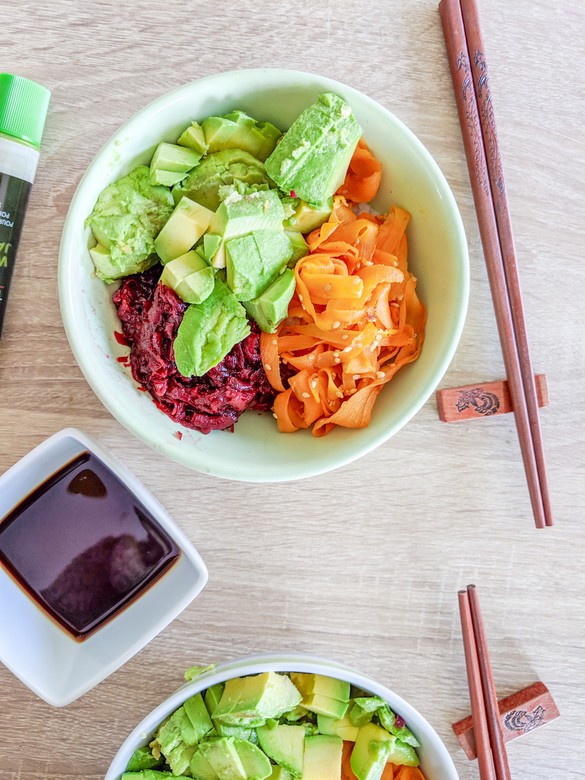
Chirashi-zushi is translated into scattered sushi in English. Referring to two types of chirashi where one is made with the usual white rice and sashimi toppings common in the Kanto area in Tokyo.
Common Ingredients:
Meanwhile the other chirashi bowl is what?s typical in Japan and has no meat. But ingredients like egg omelette, fried tofu and vegetables.
Generally made in Japanese households with ingredients like mushrooms, carotenoid, green beans, or lotus root.
Although Chirashi and Kaisendon can be very similar the difference is that when served in restaurants, chirashizushi uses vinegar fermented sushi rice.
Seasoning Preferences:
Additionally chirashizushi doesn?t need much seasoning, so there?s no need to dip the sashimi in soy sauce or wasabi.
However, to put some extra seasons to flavor the food, you put the seasoning directly on the chirashizushi.
Chirashi Sushi History
Chirashi Sushi Background:
Although the history is a bit vague for chirashi sushi. The first appearance of this sushi cuisine is in the Edo period of 1600?100s. And is a dish that many villagers would eat for certain special celebrations.
Furthermore, although Edo society at the time was relatively peaceful with high economic growth, it also had many strict social customs.
And this means having regulations to protect political stability, so social changes between the classes was impossible.
Revolutionary Development:
Hence commoners would make chirashi sushi to hide the extravagant ingredients of fish and toppings with the help of white rice.
Soon came the idea of using vinegar to add to the rice to help refrigeratethe seafood longer. So there were many excess pieces of unused sashimi which turned into a bowl of chirashi.
Different Styles of Chirashi Sushi
Although there are many styles of Chirashi Sushi. There are two types of style that really stand out: Osaka Style and Tokyo Style.
Osaka Style
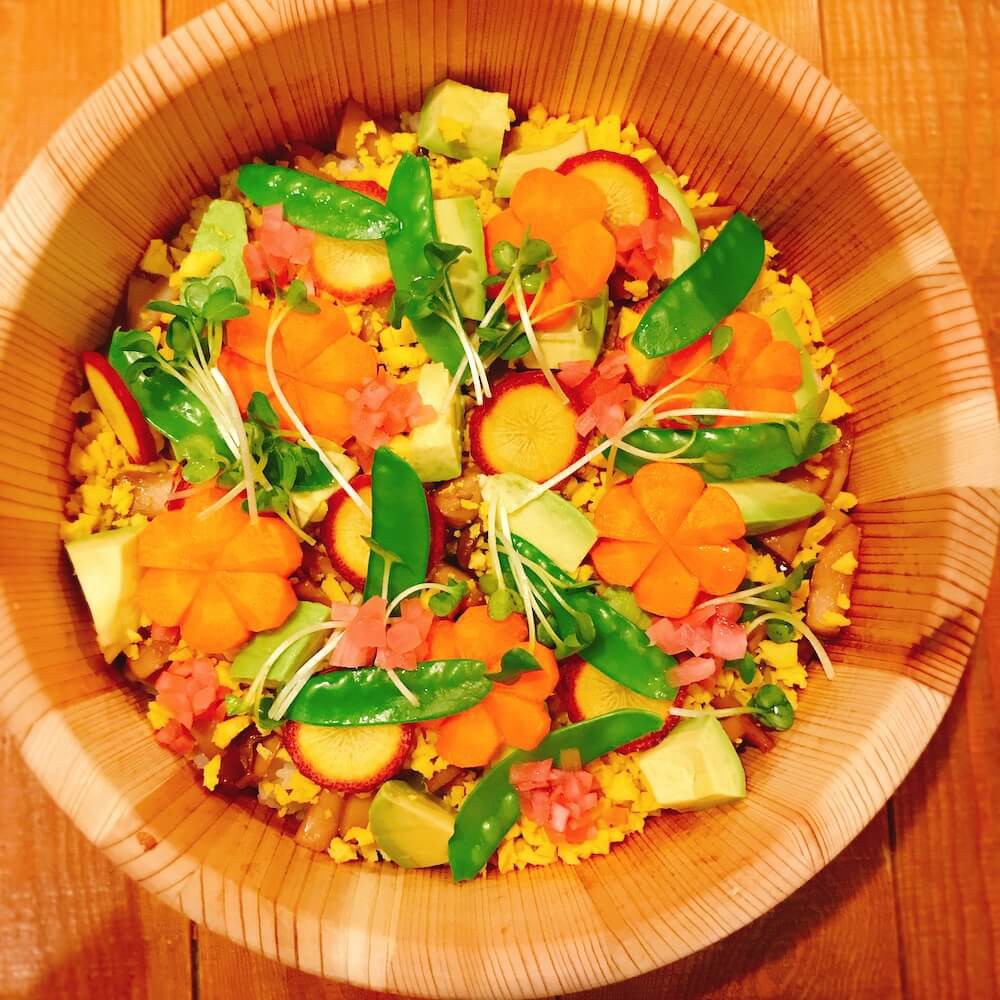
Firstly the Osaka style is commonly referred to as barazushi or gomoku sushi. And the ingredients differ by being either cured or already cooked instead of the raw seafood common in chirashi.
Additionally the popular style of Chirashi of mixing the cooked ingredients with sushi rice is great for preventing refrigeration problems.
Edomae/Tokyo Style
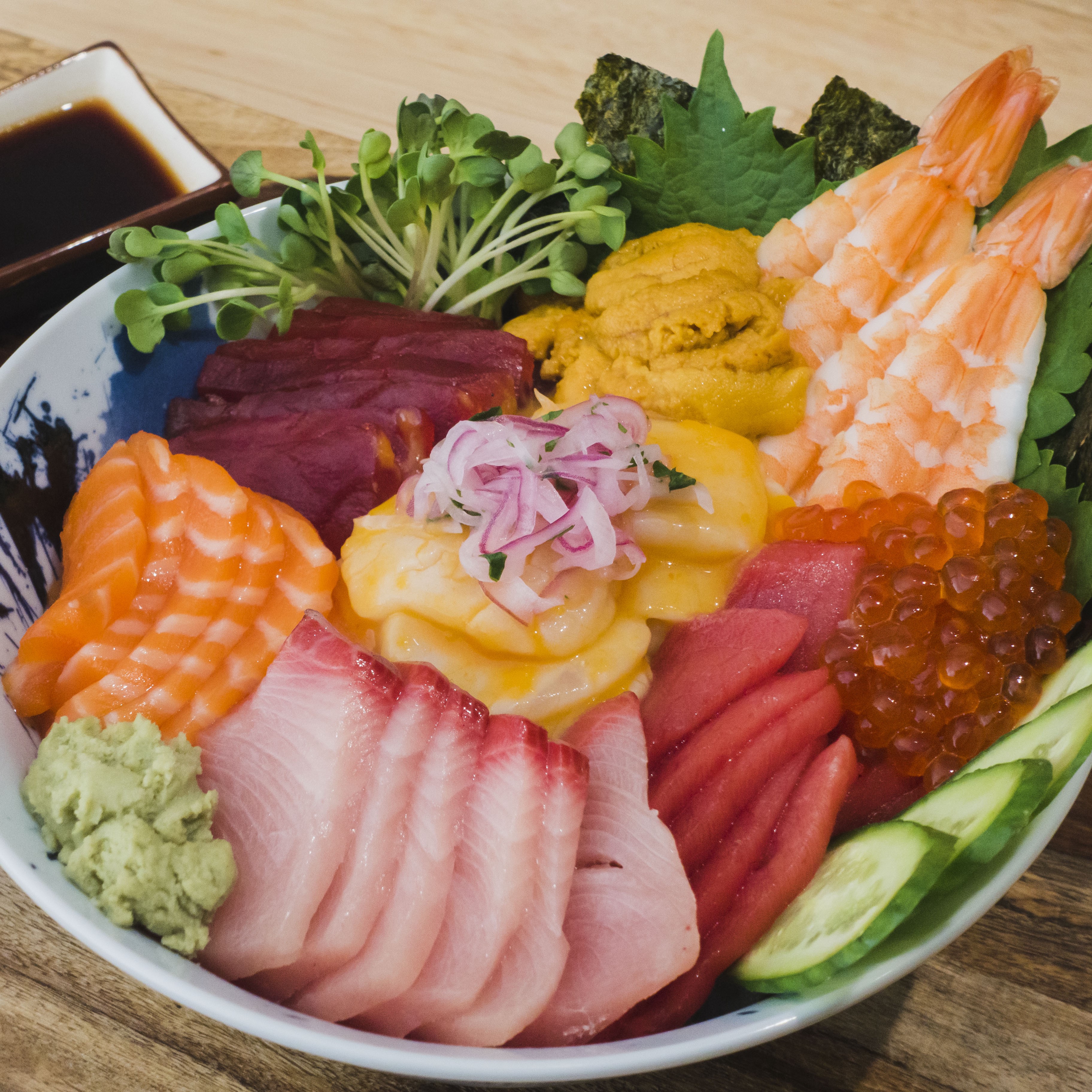
Now this is the common type of chirashi seen in sushi restaurants. With many different raw sashimi and other garnishes on top of a base of sushi rice. Where the fish is laid on top, but not mixed along with the sushi rice.
Kaisendon VS Chirashi Sushi
Comparatively Kaisendon is actually much less expensive to Chirashi Sushi. Since it has less varieties of sashimi and more vegetables.
While Kaisendon has only been a more recent dish. But Chirashi Sushi has a long origin dating back to the Edo Period.
Additionally, Chirashi Sushi needs less seasoning of soy sauce or wasabi in comparison to Kaisendon.
Moreover, Kaisendon is not as great as an option for many people not used to eating raw fish. So the Osaka style of Chirashi Sushi where the food is cooked is a better choice.
How to Eat Chirashi Sushi & Kaisendon
Soy Sauce & Wasabi Condiment:
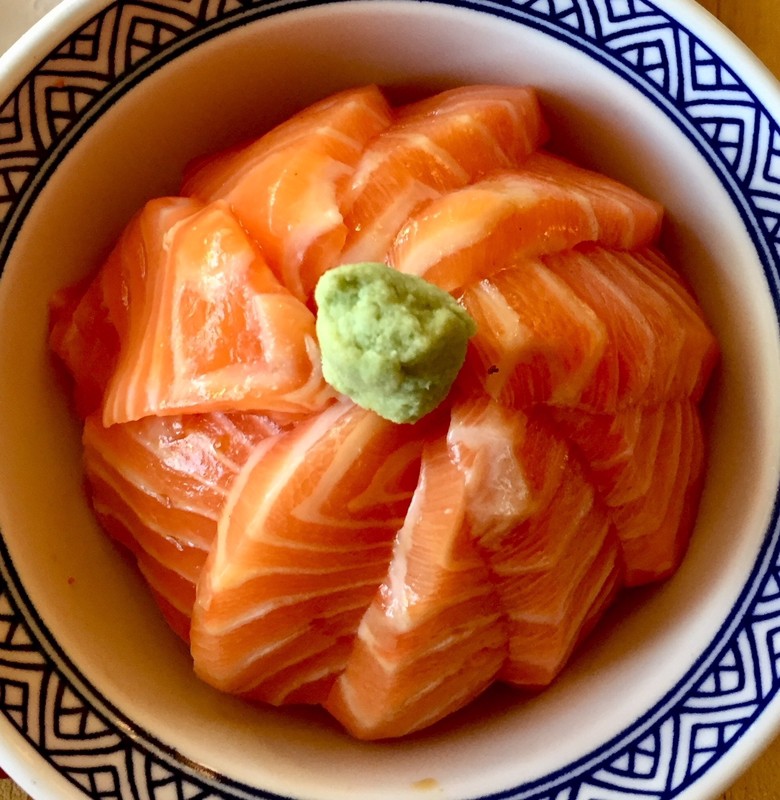
Firstly, when planning on adding some soy sauce to the food it?s best that you have another separate bowl. Since too much soy sauce in the rice will make the rice super soggy.
Cultural Etiquette:
Furthermore, in traditional sushi restaurants where the itamae(sushi chef) prepares the food for you. Make sure that you savor the food without pouring the condiments in.
With Chopsticks:
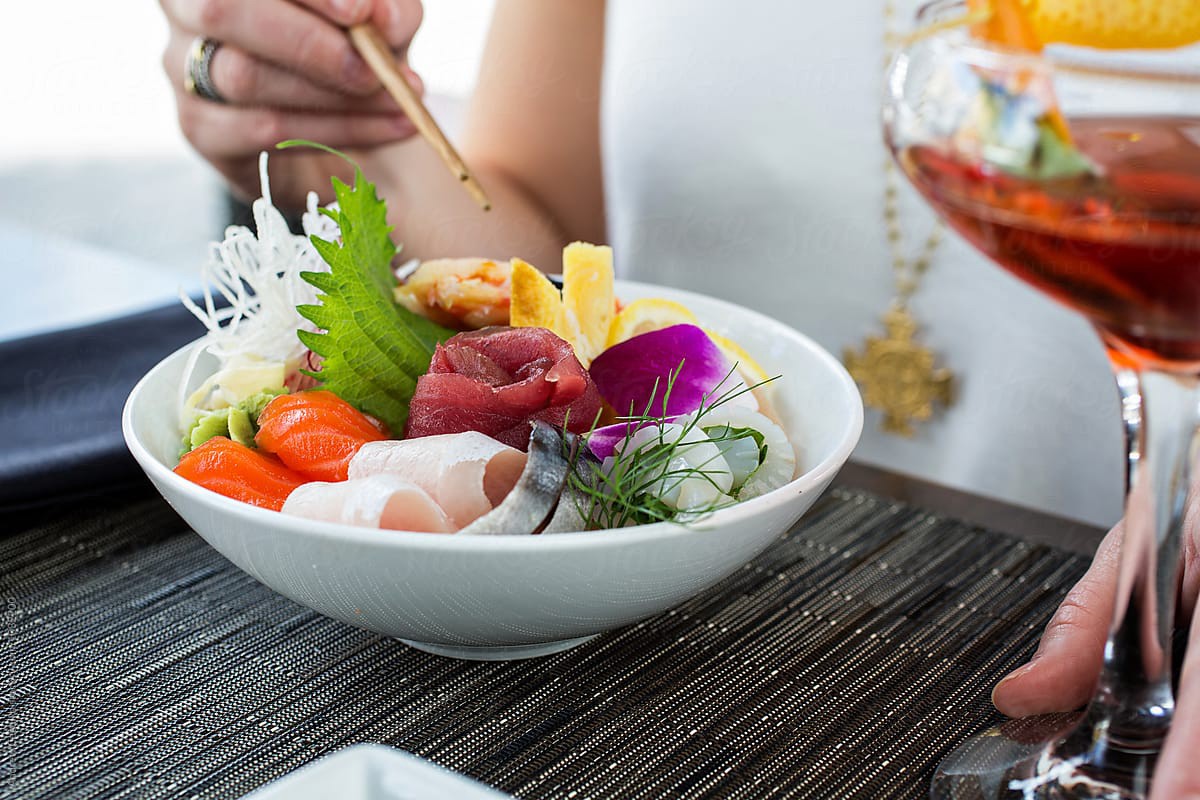
Because each sushi dish is perfectly prepared in order to give the best experience to the eater. Additionally, it shows that the eater knows etiquettes and how to best savor the food.
Using Your Hands:
Meanwhile, if you?re not comfortable with using chopsticks to pick up the individual pieces. Another way is to simply use your hands to pick up the toppings singularly.
Personal Preference
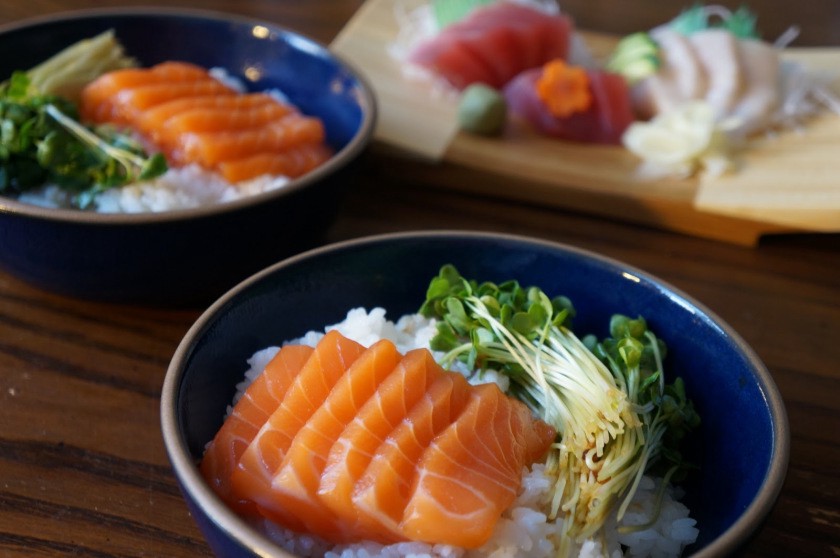
Some people really prefer eating the food separately. So they can taste the flavor of the rice and the texture of the fish individually. I agree this is a good method to taste the fresh crispiness in its best form.
Personally nothing is better than combining the sushi rice along with the sashimi. This way it can balance the taste of the fish with the more pure texture of the rice. Then letting the two different flavors interchange and bring out the best of both sides.
